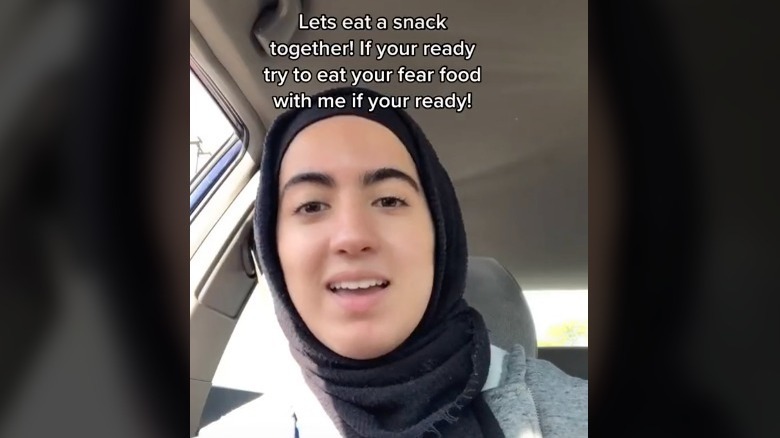The Important Reason TikTok Videos Of People Eating Are Going Viral
Over the past year, the promotion of unhealthy eating habits has increased exponentially on social media. Whether it's influencers advertising pro-diet supplements and other diet items or unrealistic body-editing filters used on apps like TikTok and Instagram, these things can be especially triggering for those who have an eating disorder (via BBC News)
In addition to that, studies have shown that the isolation of lockdown has contributed massively to an increase in eating disorder patients in countries like England (via the Guardian).
To combat this, creators like 18-year-old Sara Sadok started uploading videos of themselves eating a meal, encouraging viewers to join in with them (via Good Morning America). "I know that was hard, and I'm really proud of you," Sadok says in one video (via HuffPost). "Let's have our second bite together."
Sadok's series, titled "Let's Eat Together," has become one of TikTok's most popular trends of late, and has quickly saturated the negative pro-diet culture and advertisements that were floating around the app.
This TikTok trend aims to tackle the isolation some viewers may be feeling
"There are so many videos showing people how to lose an absurd amount of weight in a small amount of time," Sadok said. "It's potentially triggering content."
Instead, Sadok hopes to bring awareness to those who have an eating disorder, and show them that they're not alone. The first bite can be very difficult, as Carolyn Comas, a therapist at Eating Disorder Therapy LA explained to HuffPost, "In that moment, your thoughts can be very loud and filled with reasons not to eat ... it shows the person struggling that their biggest fear is most likely not going to happen by eating that meal or snack."
For those who find these videos beneficial, Comas also suggests joining eating disorder support groups on apps like Instagram. One of the most successful accounts is @covid19eatingdsupport, which is monitored by professionals "to help reduce triggering content." Comas says that "as long as there are trigger warnings, these eatalongs can be super helpful."
If you are struggling with an eating disorder, or know someone who is, help is available. Visit the National Eating Disorders Association website or contact NEDA's Live Helpline at 1-800-931-2237. You can also receive 24/7 Crisis Support via text (send NEDA to 741-741).

